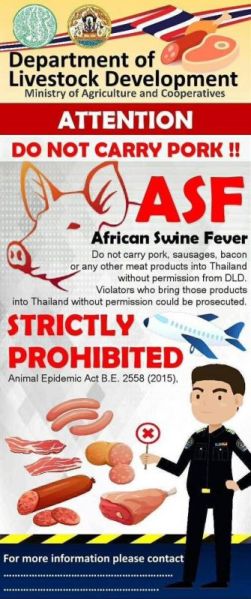Phuket News reported that these highly-trained sniffer dogs are being tasked with identifying potential carriers of the virus among incoming visitors. The move comes as Thailand aims to prevent the spread of ASF, which poses a significant threat to the country’s swine industry.
Recent cases of individuals attempting to bring pork products into the country have already been reported. Thai localities have increased the dissemination of information about the ban on uncontrolled pork and have shared images of confiscated sausages at Suvarnabhumi International Airport in Bangkok.
According to the Department of Livestock Development (DLD) in Thailand, several incidents involving the smuggling of pork products have been thwarted at the airport. One such incident occurred on October 13, when local authorities discovered 31 kg of pork sausage in the possession of a Filipino passenger on a Cebu Pacific flight. The contraband was promptly confiscated. In another case, passengers carrying sausage products and bacon on a Philippine Airlines flight were also caught attempting to bring in prohibited items.


In an effort to raise awareness among tourists, multiple signs have been erected at the airport in different languages, including Vietnamese, Chinese, and Laos, cautioning against bringing pork products into Thailand. Vietnamese tourists, in particular, have been advised against carrying items such as cotton balls, small bottles of fish sauce, and dried braised anchovies, as these are often part of their traditional cuisine. The intention behind these measures is to minimize the risk of unintentional smuggling and potential outbreaks of ASF.
Mr. Nguyen Minh Man, Director of Communications and Marketing at TST Tourist Company, emphasized the importance of adhering to these regulations. He stated that while Vietnamese tourists may have a tendency to bring certain food items when traveling abroad, it is crucial to avoid bringing pork products into Thailand to prevent any complications or legal troubles.
@thanhnien.vn
